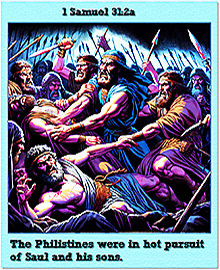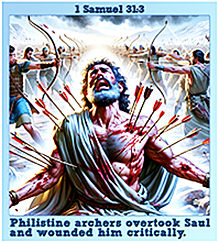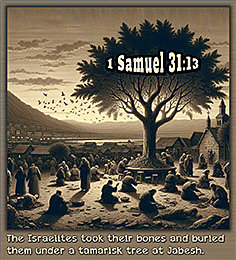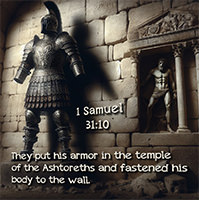1 Samuel 31:1–13 . . . Bible Study Summary with Videos and Questions
“Saul and His Three Sons, Slain”
Sadly, the story of Saul’s death is a tragic one. When the Philistines gathered to fight Israel (see summarization of 2:1–25), David and his men came all too close to going into battle (28:1–2; 29:1–11). Saul was terrified, Samuel was dead. This is one of the few occasions when Saul sought divine guidance, but it was too late. In desperation, he sought guidance from the grave, not from heathen deities but from Samuel, the deceased prophet. He did so by using a medium, which was clearly forbidden. Having already removed the mediums and magicians from the land, he instructed his servants to find a medium, the witch of Endor. Disguising himself, he went to her, asking her to conjure up Samuel. The woman was terrified when Samuel appeared. His message to Saul was consistent, informing Saul that God had turned against him and that he'd die in battle the next day when God would hand him over to the Philistines. He and his sons would die, and God’s prophecy through Samuel would be fulfilled.
As foretold by Samuel's ghost, the Philistines prevailed over Saul and the Israelites. Saul’s three sons, including Jonathan, were killed. His death didn't come easily or quickly. An archer’s arrow found and seriously wounded him. Knowing that he'd die, he pled with his armor bearer to kill him quickly, rather than let him fall into the hands of his enemies and be tortured. His armor bearer was unable to kill the king so Saul fell on his own sword.
[Note: Click the link to This Week’s Passage near the bottom of this page to read today’s Scripture.]
The Battle of Mount Gilboa (31:1–6)
The Death of Saul
31 1Now the Philistines fought against Israel; the Israelites fled before them, and many fell dead on Mount Gilboa. 2The Philistines were in hot pursuit of Saul and his sons, and they killed his sons Jonathan, Abinadab, and Malki-Shua (1 Sam. 31:1–2).
When David and his men parted company with the Philistines and Achish (see Week 30's summary), the Philistines headed north to Jezreel Valley, while David and his men went south toward Ziklag; presumably they reached their destinations at about the same time, with Saul and the Israelite army fighting Philistines just about the same time that David and his men were in pursuit of the Amalekite raiders. We know this after reading that David learned of Saul’s death on the third day after he and his men arrived back at Ziklag, victorious over the Amalekites (2 Samuel 1:1–2). In Jezreel, Israel's armies experienced a crushing defeat by the Philistines. When the Israelites realized they couldn't win, they broke ranks and ran for their lives, but "many fell slain on Mount Gilboa."
Previously, God had announced that Saul would deliver his people from the hand of the Philistines (9:16). However, he frustrated God's purpose by not following the LORD faithfully. Consequently the Philistines got the better of Saul and his soldiers then. Now, God providentially removed David from this conflict by occupying his attention even farther to the south, thus unable to fight with or against the Philistines. It was God’s will that in the battle between Israel and the Philistines, the Philistines would win and Saul and his sons would be slain. Tragically, his sons were affected by God's judgment against their father Saul. Brave and worthy Jonathan died as we might have expected him to die, loyally fighting for his God, his country, and his father the king, until the very end.
The three sons' death was a tragic-yet-important part of God's plan. In removing the logical heirs to Saul's throne, God cleared the way for David to become the next king of Israel. We know that if Jonathan had survived, he'd have gladly yielded the throne to David (18:1–4). But the same couldn't be said of Saul's other sons; so God was merciful to the nation and to David in taking Saul's two other sons in battle. God was also merciful to Jonathan, sparing him the ordeal of having to side with David against his own brothers. (As it was, David had to deal with Ish-Bosheth, the one surviving son of Saul, before taking the undisputed throne of Israel, as we'll soon see in 2 Sam. 2:8–4:12.)
This six-verse passage states that the battle against the Philistines intensified on Mount Gilboa. The account mentions Saul being hit by many arrows and becoming severely wounded. Rather than face capture and mockery by his enemies, he asked his armor-bearer to kill him (v. 4). When the armor-bearer refused, Saul fell on his own sword, ending his life. He knew the battle was completely lost. The next day, the Philistines found Saul’s body and those of his sons. They cut off his head, stripped him of his armor, and sent messengers throughout their land to announce the news. They then fastened Saul’s body and those of his sons to the wall of Beth Shan. Note: The account of Saul's death here differs from the one that the Amalekite messenger gave David later, which the writer of Samuel recorded in 2 Sam. 1:1–10. Chapter 31's account, however, is quite clearly the factual one of the two (cf. 1 Chronicles 10:1–14 for a third account).
Jonathan, a faithful son and subject of the king, followed his father into battle. The death of this godly man, because of his father's sins, seems unfair as well as tragic, but God permitted it. David would replace Saul on the throne. Another son of Saul, Ish-Bosheth, must not have been present in the battle (cf. 2 Sam. 2:8, 10, 12). Likewise, Abner, Saul's general, somehow escaped. However, three of Saul's sons died with him, fulfilling Samuel's prophecy (1 Sam. 28:19).
Killing one's self . . . David was Saul's armor-bearer before he had to flee from Saul (16:21) who, probably fearing that the Philistines would torture and abuse him as they'd done to Samson, asked his armor-bearer to kill him. But the young man refused to do so. Why this armor-bearer resisted Saul's order to kill him is unclear; perhaps he feared the disgrace that would have hounded him, or even death, for killing the king. Or perhaps, like David, he feared God and wouldn't kill the LORD's anointed. [Note: Josephus regarded Saul's death an act of great courage on his part.]
While sadness fills this dramatic account of dying, it's also sad to see the absence of any kind of sorrow, or repentance, or crying out to God on Saul's part. He was told the previous day that he'd die (28:19), yet he didn't seem to have prepared his soul to meet God in any way. Remember that the events of this chapter happened some 20 years after Saul first heard the announcement of judgment against him from the prophet Samuel. Perhaps Saul thought that time was on his side, since God's announced judgment against him hadn't happened immediately. But time was against him; during the 20 years since, his heart became increasingly hard against Father God.
Saul's armor-bearer also committed suicide in this battle, perhaps because if he'd outlived the man and king whom he should have protected with his life, he'd have been executed for dereliction of duty. What's more, the soldiers who went into battle with Saul also perished. In the end, the king not only died but took down with him many of his own men.
The Aftermath of the Philistines’ Victorious Battle (vv. 7–13)
7When the Israelites along the valley and those across the Jordan saw that the Israelite army had fled and that Saul and his sons had died, they abandoned their towns and fled. And the Philistines came and occupied them (1 Sam. 31:7).
The battle didn't affect only the Israelite army. All the area's residents fled as well when they heard of Saul's and his sons' deaths. The Philistines came and occupied these once-Israelite towns. The battle was a crushing defeat that changed the areas then controlled by the Philistines. Israel's north and south became divided, thereby greatly weakening it.
The Philistines cut off Saul's head, just as David had previously cut off Goliath's, the Philistine champion (17:51). They hung it as a trophy in the temple of Dagon (1 Chron. 10:10). They also circulated Saul's weapons and sent them on a tour of Philistine pagan temples before finally depositing them in the temple of Ashtaroth, their chief female deity. This book began with scenes from God's temple, but it ends with scenes in the temples of Israel's pagan enemies. David's faith had brought Israel success, while Saul's disobedience had lost it. The Philistines fastened Saul's decapitated corpse on the wall of their nearby town of Beth Shan. In the ancient Near East, the treatment of a corpse was very significant. If people, even enemies, honored a person, they treated his corpse with care, giving it an honorable burial; but if they didn't respect him, they treated his dead body with contempt. The Philistines showed great disrespect for Saul by hanging his dead body on the wall of Beth Shan, which was a town at the east end of Jezreel Valley, near where the battle had taken place.
However, the men of Jabesh-Gilead rescued Saul's corpse from further humiliation, burning it, probably because the Philistines had abused it, and possibly to prevent disease. They then buried the remaining bones. The tamarisk tree (v. 13a) under which the people buried Saul was very different from a royal tomb, but that kind of tree was a symbol of life since it was an evergreen. The writer may have wanted us to remember that, earlier, Saul had played the fool under another tamarisk in Gibeah (cf. 22:6). Later, we learn that David honored Saul and Jonathan by digging up their bones and burying them more appropriately in their family tomb (2 Sam. 21:12–14).
The Israelites' seven-day fast (v. 13b) also honored Saul by serving as a powerful, public display of gratitude and respect for the man who’d previously saved their city. The fast that followed the brave act of men of Jabesh — bravely risking their lives to retrieve the bodies and provide them with a proper burial — was a final, solemn defiance against the Philistines’ attempt to dishonor their king. It was a way of saying that even in death, Saul would be treated with the respect and reverence he deserved. But that fast would have been much less than the accumulation of honors granted other great leaders of Israel. The writer evidently recorded all these details to show the shame and humiliation involving Saul’s death because he’d departed significantly from the LORD.
Concluding Considerations about “1 Samuel”
This is how the life of Israel's first king, the man after the Israelites' own heart, ended. Saul was full of promise at his anointing, having many natural qualities that could have contributed to a successful reign. He also possessed the Holy Spirit's enablement after his anointing. Unfortunately, he didn't become a source of blessing to Israel and the world, nor did God bless him personally. Instead he became a curse to Israel, the world, and himself. He did so because he failed to acknowledge Yahweh as the true king of Israel; and he failed to view himself as Yahweh's servant. Saul's life teaches us that the key to blessing or cursing is one's trust in, and obedience to, God.
Saul's death and Jesus Christ's Jesus was consistently trusting and obedient to his Father's will. He laid down his life as a sacrifice for others, rather than taking it himself. He spent the night before his death in prayer to his Father, whereas Saul spent his last night consulting a medium. Jesus Christ blessed many through his death, even the whole human race, but Saul brought blessing to others through his death, only because it cleared the way for the arrival and acceptance of someone better.
Chapters 21–31 contrast the rise of David and the fall of Saul. The reason for both outcomes was clearly the extent of their commitment to Yahweh. The writer also developed the motif of the proper response to the LORD's anointed in this part of the book. David's respect for the priests and his seeking of God's will through them shows the proper attitude. Saul on the other hand slaughtered them, showing that he no longer cared about worshiping Yahweh, seeking instead guidance from the spiritual underworld. God spared people who acknowledged David as his anointed; they became sources of fertility. Those who opposed David suffered God's curse and died.
One Samuel opens with Samuel's birth, hope, and an answer to prayer; it closes with Saul's death, despair, and an act of divine judgment. This book of transition contrasts God's rule with man's. When we put things under our control, all will turn out as it did for Saul. But, if we let God rule, they'll turn out well, as they did for Samuel and David.
The records of Samuel illustrate how a hearty commitment to God can overcome a terrible environment. Saul illustrates the consequences of double-mindedness in a person, wanting to serve God some of the time and himself the rest of time. He was typical of believers who yield to the desires of the flesh. David, on the other hand, illustrates what happens when a believer surrenders to and prioritizes and honors God. He or she experiences failure, as well as success — but the general direction of his or her life is upward.
† Summary of 1 Samuel 31:1–13
This short passage narrates the tragic end of King Saul and his sons during a fierce battle against the Philistines on Mount Gilboa. The Israelite army is defeated, many fall, and Saul is critically wounded by archers (31:1’3). Rather than be captured by the enemy, Saul takes his own life by falling on his sword after his armor bearer refuses to kill him (vv. 4–5). Saul’s three sons — Jonathan, Abinadab, and Malki-Shua — also die in the battle (v. 2). After the battle, the Philistines desecrate Saul’s body by cutting off his head, stripping his armor, and hanging his body on the city wall of Beth Shan (vv. 8–10).
The men of Jabesh-Gilead honor Saul by bravely retrieving the bodies of Saul and his sons from Beth Shan under cover of night (v. 11). They bring the bodies back to Jabesh, where they burn them and bury the bones properly, mourning for seven days (vv. 12–13). This act of loyalty and respect reflects the gratitude of Jabesh-Gilead for Saul’s earlier deliverance of their city. The chapter closes with a somber reflection on the consequences of Saul’s disobedience to God, marking the end of his reign and the transition to new leadership in Israel.
Key points with verse references:
• The Israelites are defeated on Mount Gilboa; Saul and his sons are killed in battle (vv. 1–3).
• Saul, wounded, commits suicide to avoid capture by the Philistines (vv. 4–5).
• The Philistines desecrate Saul’s body by hanging it on the city wall at Betty-Shan (vv. 8–10).
• Men of Jabesh-Gilead retrieve and honor Saul’s and his sons’ bodies by burning and burying them (vv. 11–13).
This passage starkly portrays the consequences of failed leadership and disobedience while highlighting themes of honor, loyalty, and the somber close of an era in Israel’s history. The chapter emphasizes the tragic consequences of Saul’s rebellion against God and the end of his kingship.
This Week's Passage
1 Samuel 31:1–13
New International Version (NIV) [View it in a different version by clicking here; also listen to chapter 31 narrated by Max McLean.]
† Summary Video: “The First Book of Samuel”
† Watch this introductory video clip created by BibleProject on bibleproject.com.
- Q. 1 What do you take to heart from this first book of Samuel? Any life applications?
- Q. 2 Where do you think Saul is spending eternity? Why so?





